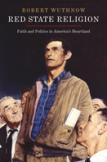The Matter with Kansas
Abraham Lincoln delivered a stirring speech about slavery at a Methodist church in Atchison, Kan., in 1859. Congregational preachers migrated west to “bloody” Kansas to urge it to vote to become a slave-free state. It did so in its constitutional convention of 1859. In that Constitution, the drafters stated: “Kansans were grateful to Almighty God for our civil and religious privileges.” Kansas has voted Republican more than any other state in the union, voting for a Democratic president only four times since 1861 (1896, for William Jennings Bryan; 1932 and 1936, for Franklin Roosevelt; 1964, for Lyndon Johnson). Although it has elected Democrats as governor or to the House of Representatives or Senate on regular occasions, almost 70 percent of all its elected officials have been Republicans. But that party also has never been a monolith in Kansas.
In 1896 William Allan White, the sage of Emporia and Pulitzer Prize winning journalist, wrote his famous essay: “What Is the Matter With Kansas?” Allen, a progressive Republican and close friend of Teddy Roosevelt, was complaining about the rise of populism in the Kansas prairies, as farmers resisted Eastern banks. In 2004 Thomas Frank picked up that theme, in his similarly entitled book, What’s the Matter With Kansas? in which he argued that Kansans’ political predilections belied their true economic interests. In an essay on Prohibition, H. L. Mencken said in 1927, Kansans have been persistently mocked as being, as in the title of Robert Smith Bader’s book, Hayseeds, Moralizers and Methodists: The Twentieth Century Image of Kansans.
Yet Lucy Stone telegraphed to her friend Susan B. Anthony in 1867 that “ Kansas leads the world” on the issue of suffrage. In fact, Kansas early on granted women limited suffrage, at first, in municipal elections in 1867, and then full suffrage in 1912, one of the first states to do so. It never adopted capital punishment.
Robert Wuthnow, a brilliant sociologist of religion and himself a native of Kansas, gives us a careful sociological history of the intertwining of religion and politics in this quintessential red state. He notes the fierce battles over abortion in Wichita and the murder of the abortionist George Tiller in 2009, as well as battles over evolution and gay marriage. Yet he dispels one-sided stereotypes of Kansas politics as uniformly archconservative. Beginning as a battleground of abolitionism, Kansas moved early on toward Prohibition, initially seen as a progressive enactment to further family stability and a work ethic. Kansas adopted Prohibition by 1880 and kept it on the state law books even after the repeal of the 18th Amendment.
In point of fact, for much of Kansas’ history it was split fairly evenly between Methodists and Catholics. Kansas withstood the worse ravages of the Ku Klux Klan, which was attacked by Methodists and William Allen White. Both Methodists and Catholics kept the politics of Kansas from veering toward extremes. Republicans were often, like White or Alf Landon, relatively progressive or at least pragmatic. After the loss of Kansas in 1896 to William Jennings Bryan, pragmatic Republicans bounded back and found ways to support farmers in cooperatives, freeing them from anti-trust laws. Kansas was also the battleground that gave rise to the historic case Brown v. Board of Education, which outlawed segregation in public schools.
After the 1960s, many new in-migrants came to Kansas from Oklahoma and other southern states, tilting the religious balance toward Southern Baptist and other evangelical churches, which were better than the Methodists at organizing large mega-congregations in growing urban enclaves around Kansas City and Witchita. At present, one third of all churchgoers in Kansas belong to conservative Protestant churches (420,000). Catholics are close at 400,000. Methodists, historically the largest congregation, now lag behind at 200,000. Sixty-four percent of Kansans attend church at least once a month.
In 2005 Kansans voted to define marriage as between a man and a woman. Their vote to ban gay marriage, however, was only 4 percent higher than found in national surveys on the question and lower than that found in 20 other states. A careful study of Kansas’ myriad and rich associational life in Oskaloosa shows how churches are integrated into small town life. Church memberships overlap into business, governmental and school settings. Vigorous associational life in Kansas compensates for a long sense of estrangement from the federal government. Local civil society flourishes instead.
In Wuthnow’s nuanced and careful study, Kansans come across less as hayseeds or off-the-wall moralizers than as pragmatic conservatives, committed to traditional families and fiscal conservativism. They are skeptical of big government and dedicated to preserving simple and vital virtues. Wuthnow has penned a “must read” book for those who would understand—and not just caricature—red state religion and how it intertwines with politics.
This article also appeared in print, under the headline “The Matter with Kansas,” in the July 2, 2012, issue.








